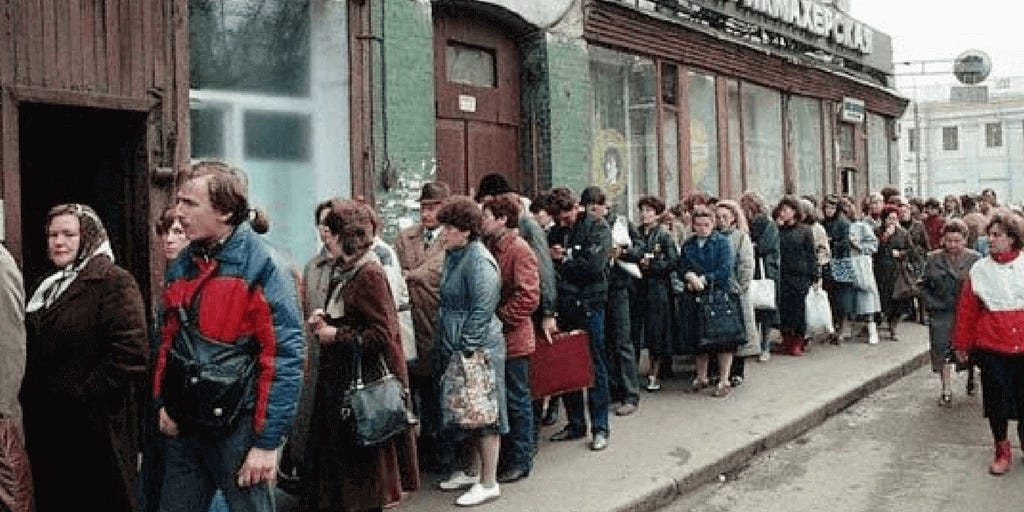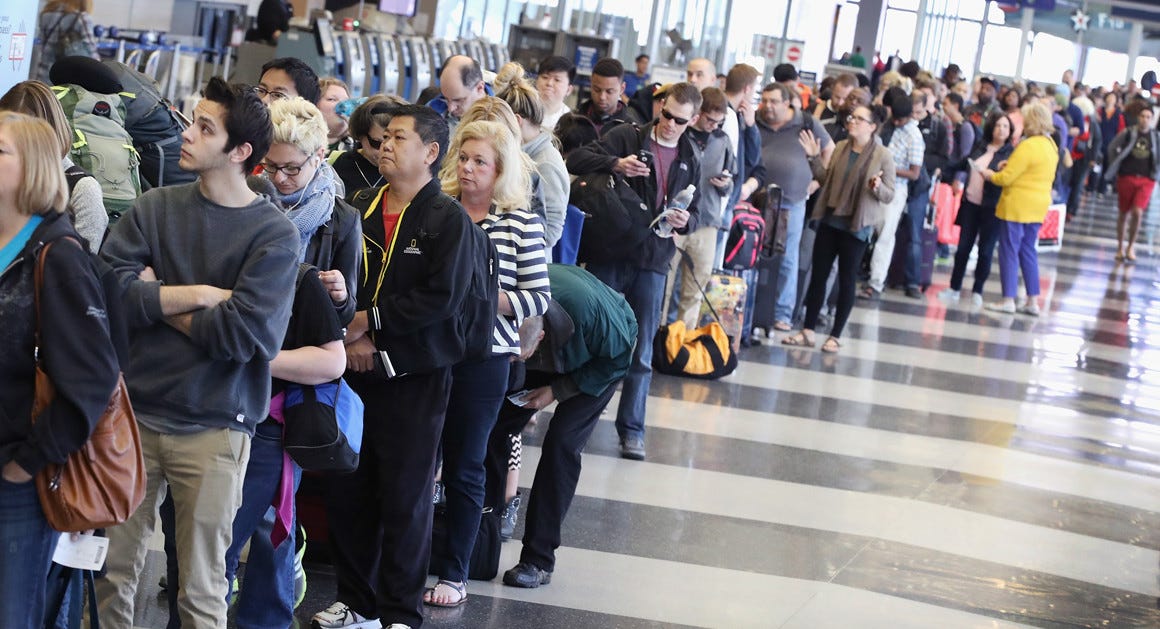Dear Friends,
I’m sharing a grumpy essay in response to some aggravating travel this week. At
, more productively shares thoughts on the journey that’s led her to launching a new writing workshop.Best,
Sam
IS AMERICA A FAILED STATE?
The answer is no. This piece is really just an overheated complaint about travel. But there are some trends that I’ve been noticing in American life that are really deleterious, that really give the impassion (when I’m in a sour mood) of the system being truly ruptured.
Here’s a completely ordinary travel experience that I have had recently. I’m setting out on a shoot. My partner books the ticket under my nickname not my full first name. I try to change the name online. It’s impossible. I call customer service. For about ten minutes I argue with a bot, trying to convince the bot to connect me to a person and the bot trying to convince me that it can do everything a person can do. I decide to believe the bot and explain that I want to change the name on my ticket. The bot can’t hear me properly and keeps trying to enroll me in different types of frequent flyer programs. Eventually, I stand my ground and insist on talking to a human. No humans can be found and I’m told to wait for a callback. The callback comes an hour later and turns out to be from someone who isn’t authorized to help. I’m transferred elsewhere. After a long stint of hold music, I’m on the phone with a perfectly pleasant, professional person, who tells me her name, asks me how I am doing, that the call is being recorded for training purposes, eventually gets to the problem, and then gets on the phone herself with somebody else to change the name on the ticket. While she’s speaking, I hear a rooster crowing in the background, and, unable to resist, ask her where she is — hesitantly (this is off-script for her) she tells me that she is in the countryside near Manila, and then the change is completed and she asks me if I can do anything else, wishes me a safe flight, and encourages me to take a customer service satisfaction survey.
During my travels around this time, I also find myself unable to change a flight because change fees have jumped to $400; am unable to rent a car because the airport has run out of rental cars (supply-chain issues connected to the cars’ computers); am unable to return a mistaken order in an airport restaurant because the orders are now all done over iPad and there are no waiters to alert (only a single harried busboy); am late for a flight because there’s a long line of flagged bags at security and a security officer comes by only long enough to remonstrate with everybody for not packing more carefully before he clocks off from his shift.
All trivial complaints. As Louis C.K. put it about people’s travel stories, you are sitting on a chair in the sky and all you can think to do is complain. But it is important. Air travel is an artery for the country, and, if I have some vestigial memory of air travel being glamorous, of people sort of dressing up for it, now it feels like being in a bus station but with extortionist prices, endless disregard from the powers-that-be, and no one around to complain to.
My travel the last couple of years has been all over the Continental U.S. and the basic sense — I write about this at length in my travel essays on this Substack — is that it’s just not a happy place. The towns and cities all look pretty much the same — just one enormous strip mall; all franchise chains. People look miserable — unhappy, unhealthy, without any very clear sense of purpose of what they’re living for.
In terms of historical trajectories, it’s only too obvious what happened. The corporations came through, dropped prices everywhere, drove all the mom ’n’ pop shops out of business. The real jobs — whether farming or manufacturing — disappeared; and everybody finds themselves in some precarious employment situation in the shadow of the major corporations.
For a long time, this seemed like it was unfortunate but an inevitability of industrialized ‘progress’ — that maybe wealth would flow out of the hinterland and towards the coasts and into more tech-forward forms of labor, and that, while it was all unfair, it would, in its way, eventually work out. But at the moment a different narrative is occurring to me. It’s that that same basic dynamic carves its way through more and more of the economy.
In the case of air transit, the same pattern is readily apparent. The major corporations, whether through slashing prices or merger deals, drove out any real competition, and the same penny-pinching service is in force everywhere. There was no particular accountability to customers (the laughable exercise of the customer service satisfaction survey at the end of any call is just a method for terrorizing the employees) and the entire customer service industry was slashed away, first off-shored and then robotized. (My experience of the vast game of high-tech, intercontinental telephone leading to this one worker up at dawn in Manila seems to encapsulate that whole trend.) That pattern was repeated in the airport restaurants, where money went to installing iPads and electronic services with a couple of utterly overwhelmed waiters and busboys racing around when the iPad orders inevitably fail to go through smoothly. And, meanwhile, in the absence of any real competition, the concessions in the airports (as well as on the planes) reached their extortionist prices. (The other day I found myself paying $5 for a perfectly ordinary bottle of water.)
The descriptions of societies reaching a failed state — I’m thinking of the USSR towards the 1960s and ‘70s — have this aspect to them. Power becomes centralized and in over-centralizing loses any accountability to the public-at-large, any transparency. The process in the U.S. is different — and has little of the violence or overt corruption of a ‘failed state’ — but is in some ways more similar to that model than one might like. Instead of the state in centralized control, it’s private corporations generously protected by the state. There are no restraining impulses (no strong anti-trust movement for instance) in the direction of blocking monopolization. And the corporate and monopolistic mentality looks the same everywhere — slash prices, drive out the competition, hook the consumer, drive up prices again.
What I suppose really makes a place a ‘failed state’ is if people talk about it in those terms. Europeans look at America’s crumbling infrastructure and tend to believe that the system is broken. Americans — who don’t travel and are used to the idea that America is the ‘richest and most powerful country in the world’ — have no idea that they might possibly be behind anywhere else. On my travels, everybody just grumbles about customer service calls, about flight delays (nobody particularly notices the ways that corporations have driven out mom ’n’ pop shops in the heartland — that’s ancient history — and nobody seems discomfited either by the iPads taking waiters’ jobs). It’s not as if anybody is rising up against the system; not as if anybody can imagine some other way. But that’s probably how life felt in, say, the USSR in the ‘60s and ‘70s — all sorts of kinks within the system but the system feeling perfectly comprehensive and intact.
At some point, though, the system starts to feel untenable — or you see its terminal point. In the case of the U.S., I think I’ve caught a glimpse of that: monopolization masquerading as the free market with negligible civic life and without even accountability to consumers. As with any state that starts to fail, it’s possible make reforms if you catch them in time. In the U.S., I would imagine that that is a robust anti-monopolization campaign if not some shift towards social democracy in the tradition of the Progressive Era and New Deal. But at the moment all of that feels very far off — not even something that’s in the conversation. Everybody just accepts the system for what it is and has a certain residual pride in it. And I’m not really advocating for anything, not saying that America is a ‘failed state’ or even on the way to being a ‘failed state.’ At the moment I’m just complaining about travel.






Interesting! Anti-monopolization could easily be a powerful bi-partisan issue. Let's hope.
This -> "monopolization masquerading as the free market" is spot on.